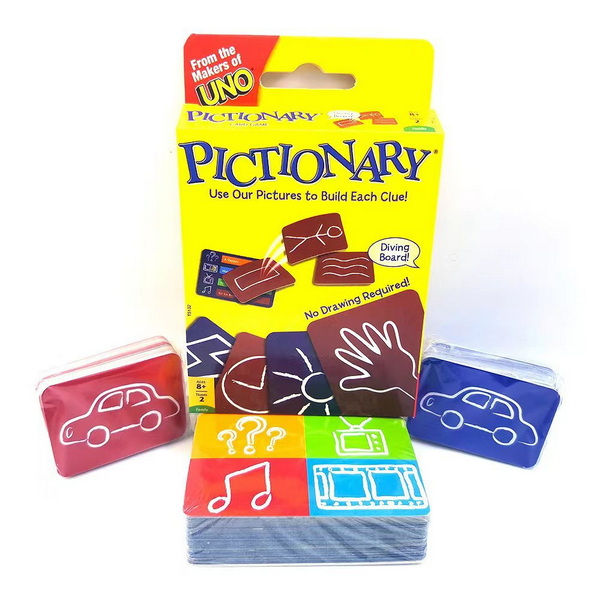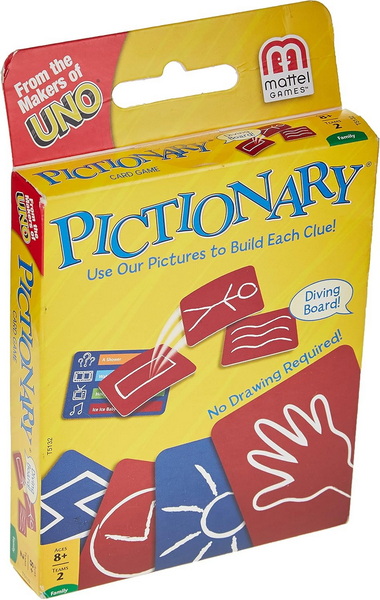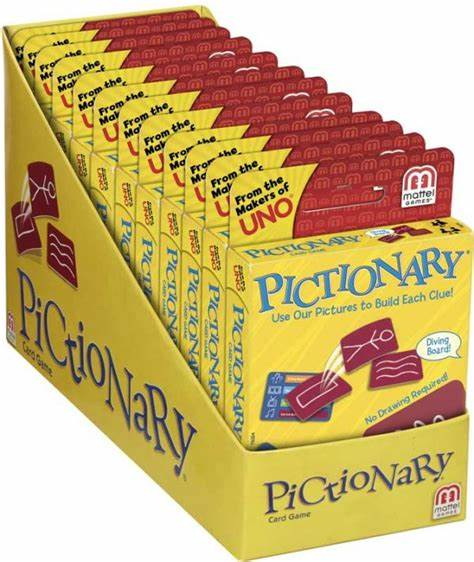Content Menu
● Introduction
● Game Components
● Setup
● Gameplay
>> Starting the Game
>> Playing a Round
>> Guessing and Scoring
>> Continuing Play
● Rules and Restrictions
>> Allowed Actions
>> Prohibited Actions
● Strategies for Success
>> For Picturists
>> For Guessers
● Variations for Different Age Groups
>> For Younger Players
>> For Adult Groups
● Benefits of Playing Pictionary Card Game
● Troubleshooting Common Issues
>> Dispute Resolution
>> Balancing Teams
>> Keeping the Game Moving
● Conclusion
● Frequently Asked Questions
>> 1. How many players are needed for Pictionary Card Game?
>> 2. Can you mix adult and kid clues in the same game?
>> 3. Is there a time limit for guessing in Pictionary Card Game?
>> 4. What should you do if both teams guess the answer simultaneously?
>> 5. Can Picturists use objects in the room along with the Picture Cards?
● Citations:
Introduction
Pictionary Card Game is an exciting and engaging twist on the classic drawing and guessing game. This version replaces the traditional drawing pad with a set of picture cards, adding a new layer of creativity and challenge to the gameplay. In this comprehensive guide, we'll explore the rules, setup, and strategies for playing Pictionary Card Game, ensuring you and your friends can enjoy hours of laughter and fun.

Game Components
Before diving into the gameplay, let's familiarize ourselves with the components of Pictionary Card Game:
- Picture Cards (blue and red sets)
- Clue Cards (with adult and kid versions)
- Category Reference Cards
- Timer (optional)
Setup
Setting up Pictionary Card Game is quick and easy:
1. Divide players into two teams.
2. Spread out the blue Picture Cards in front of one team and the red Picture Cards in front of the other team. Ensure all cards are visible to team members.
3. Choose whether to use the adult (blue) or kid (yellow) side of the Clue Cards. Place the chosen side face down in a stack.
4. If using adult clues, give each team a Category Reference Card.
5. Each team selects their first "Picturist" who will use the Picture Cards to act out the word or phrase for the round.
Gameplay
Starting the Game
1. The youngest Picturist chooses a number between 1 and 4 for the first round.
2. Both Picturists draw a Clue Card and silently read the corresponding clue (e.g., if "3" was chosen, they read the third clue from the top of the card).
3. For kid clues, Picturists announce the category to all players. For adult clues, they point to the corresponding category on the Category Reference Card.
Playing a Round
1. When both Picturists are ready, they say "Go!" to start the round.
2. Picturists immediately begin using their Picture Cards to act out the clue for their team.
3. There's no limit to the number of Picture Cards that can be used in a round.
4. Players can create scenes, combine cards, or use them as props to convey the clue.
5. Both teams compete simultaneously to guess the correct answer first.
Guessing and Scoring
1. The first team to correctly guess the clue wins the round and scores one point.
2. The winning team keeps the Clue Card to track their score.
3. If neither team guesses correctly, Picturists can agree to pass, and the Clue Card is placed at the bottom of the deck.
Continuing Play
1. After each round, new Picturists are chosen from each team.
2. The Picturist from the team that won the previous round chooses the number for the next clue.
3. Play continues with both teams competing on every clue.

Rules and Restrictions
To maintain fair and exciting gameplay, Picturists must adhere to the following rules:
Allowed Actions
- Use Picture Cards creatively to build or represent anything related to the answer.
- Act out the answer using Picture Cards (think of it as charades with picture props).
- Use basic hand gestures for "bigger," "smaller," or "shorter."
- Indicate when players correctly guess part of the clue through nodding or pointing.
- Pinch fingers together to communicate small words like "an," "the," or "of."
Prohibited Actions
- Speaking or making any sounds.
- Acting without using a Picture Card.
- Pointing to the ear for "sounds like" clues.
- Using dashes to show the number of letters in a word.
- Employing sign language.
- Indicating how many letters are in a word.
Strategies for Success
For Picturists
1. Combine Cards Creatively: Don't limit yourself to individual cards. Overlap or arrange multiple cards to create new images or concepts.
2. Use Cards as Props: Interact with the Picture Cards as if they were real objects. For example, pretend to drink from a card showing a glass or wear a card depicting clothing.
3. Focus on Key Elements: If the clue is complex, start with the most distinctive or easily recognizable aspects of the word or phrase.
4. Build Scenes: For movie titles or well-known phrases, try recreating a key scene or moment using multiple cards.
5. Exaggerate Movements: When acting out actions, make your gestures big and clear to help your team understand quickly.
For Guessers
1. Think Broadly: Don't fixate on specific details. Consider categories, synonyms, and related concepts.
2. Observe Carefully: Pay attention to how the Picturist is combining or interacting with the cards, not just the images themselves.
3. Communicate with Your Team: Share your thoughts out loud. Your partial guesses might spark ideas in your teammates.
4. Consider Context: If you know the category, use that information to narrow down possible answers.
5. Look for Patterns: If the Picturist repeats certain actions or card combinations, try to understand the underlying concept they're trying to convey.
Variations for Different Age Groups
For Younger Players
- Allow more lenient interpretations of the clues.
- Extend the time limit for guessing, if using a timer.
- Permit Picturists to use more obvious gestures or actions without cards.
For Adult Groups
- Implement stricter guessing rules (e.g., exact wording required).
- Add a time limit to increase pressure and excitement.
- Create house rules for additional challenges, such as prohibiting certain types of gestures.
Benefits of Playing Pictionary Card Game
1. Enhances Creativity: Players must think outside the box to represent concepts using limited visual elements.
2. Improves Communication Skills: The game encourages non-verbal communication and interpretation of visual cues.
3. Builds Team Bonding: Working together to guess clues fosters cooperation and shared experiences.
4. Develops Quick Thinking: Both Picturists and guessers must process information and react quickly.
5. Provides Mental Stimulation: The game engages various cognitive skills, including visual processing, language, and problem-solving.
Troubleshooting Common Issues
Dispute Resolution
- For disagreements about the accuracy of guesses, establish clear rules at the game's start about how precise answers need to be.
- Consider appointing a neutral judge for close calls or using a majority vote system.
Balancing Teams
- If teams seem unevenly matched, consider rotating players between teams after each round.
- Alternatively, give the trailing team small advantages, such as a few extra seconds to study the clue before the round begins.
Keeping the Game Moving
- If players consistently struggle to guess clues, consider allowing Picturists to pass on difficult clues more freely.
- Implement a house rule where teams can "challenge" a clue if they feel it's too difficult, allowing for a new clue to be drawn.
Conclusion
Pictionary Card Game offers a fresh and exciting take on the classic drawing game. By replacing traditional drawing with creative use of picture cards, it opens up new possibilities for fun and challenging gameplay. Whether you're playing with family, friends, or at a party, this game is sure to provide hours of entertainment while also exercising your creativity and communication skills.
Remember, the key to enjoying Pictionary Card Game is to embrace the creativity and humor that comes with trying to convey complex ideas through simple images. Don't be afraid to get silly or think outside the box – often, the most memorable moments come from the most unexpected interpretations of clues.
As you play more, you'll develop your own strategies and inside jokes, making each game a unique experience. So gather your friends, deal out those picture cards, and get ready for an evening filled with laughter, friendly competition, and the joy of shared discovery.

Frequently Asked Questions
1. How many players are needed for Pictionary Card Game?
Pictionary Card Game is best played with four or more players, divided into two teams. However, with some modifications, it can be adapted for smaller groups or even played one-on-one.
2. Can you mix adult and kid clues in the same game?
Yes, you can mix adult and kid clues to accommodate players of different ages or skill levels. Simply agree on which side of the Clue Card to use before each round, or alternate between adult and kid clues throughout the game.
3. Is there a time limit for guessing in Pictionary Card Game?
Unlike the traditional Pictionary board game, the card version doesn't typically use a timer. Instead, both teams race to guess the clue first. However, you can introduce a timer (e.g., 1-2 minutes) if you prefer a more structured gameplay experience.
4. What should you do if both teams guess the answer simultaneously?
In the rare event that both teams guess correctly at the exact same time, you can either award a point to both teams or treat it as a tie and draw a new clue for a tiebreaker round.
5. Can Picturists use objects in the room along with the Picture Cards?
While the official rules don't specify this, many groups allow Picturists to incorporate objects from their surroundings as long as they are used in conjunction with at least one Picture Card. This can add an extra layer of creativity to the game, but make sure all players agree on this rule before starting.
Citations:
[1] https://www.youtube.com/watch?v=Fh2UVrZxMmk
[2] https://www.geekyhobbies.com/pictionary-card-game-review-and-rules/
[3] https://boardgames.stackexchange.com/questions/33442/pictionary-rules-clarification
[4] https://www.youtube.com/watch?v=eS-r-9zoDa8
[5] https://www.ultraboardgames.com/pictionary/card-game-rules.php
[6] https://www.unorules.com/pictionary-rules/
[7] https://shop.mattel.com/pages/pictionary-vs-ai-faqs
[8] https://service.mattel.com/instruction_sheets/t5132-0920.pdf
[9] https://www.youtube.com/watch?v=zarnuXjplbk
[10] https://www.youtube.com/watch?v=CXUWdmZv-cg
[11] https://www.brightful.me/blog/how-to-play-pictionary/
[12] https://www.reddit.com/r/boardgames/comments/7iry30/finally_figured_out_how_to_play_two_person/
[13] https://www.youtube.com/watch?v=osZOZ_EciPA
[14] https://www.youtube.com/watch?v=Fh2UVrZxMmk
[15] https://service.mattel.com/instruction_sheets/t5132-0920.pdf
[16] http://www.donaldsauter.com/board-game-rules.htm
































